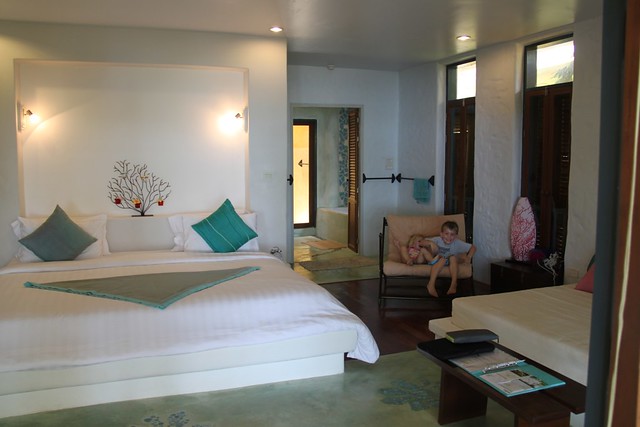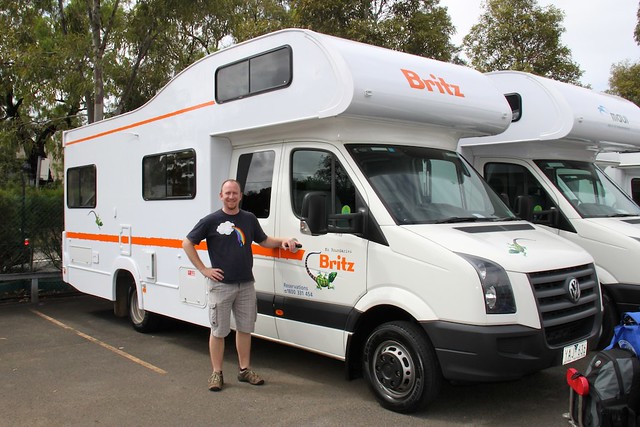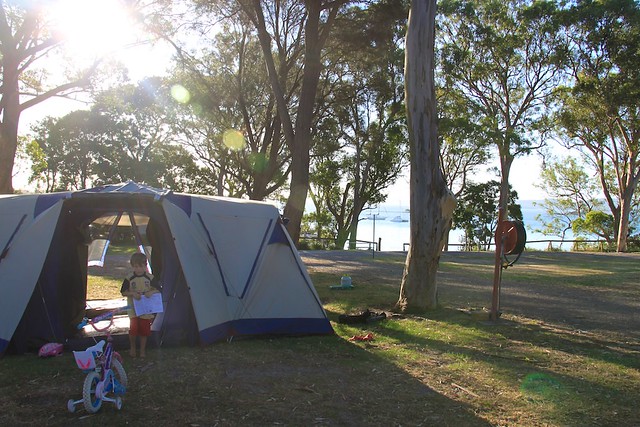Accommodation is a huge part of any travelling families budget, especially if you are travelling in Europe, Australia, New Zealand or North America. You can’t really avoid it unless you are lucky enough to have relatives with spare apartments throughout the world that are happy for you stay in … but I’m guessing that won’t be the case for most of us.
So back to what I was saying … accommodation – you can’t avoid paying for it but you can reduce your costs.
Stay longer and ask for a discount
The longer you stay in one location the better the accommodation deal you can usually find. We’ve found that as soon as you are willing to stay longer than 4 nights, most hostels and guesthouses are willing to offer you a discount on accommodation. Sometimes it’s just a few dollars per day. Others won’t charge for additional mattresses for the kids for longer stays.
Provided it’s not high season, we usually find that we can save $5-10 per night on accommodation if we are willing to stay for 4-6 nights in the one spot. $5 per day mightn’t seem like a lot but over the space a year it can really add up. If nothing else call it beer money.
Look for newly opened places
While we’re talking about asking for discounts for longer stays, often the places that are most willing to offer discounts are newly opened guest houses and hostels.
Guesthouses that have only just recently opened usually haven’t made it yet onto any of the hostel websites or into Lonely Planet. Therefore they are usually pretty quiet and willing to offer great discounts for stays longer than a few nights, particularly if you offer to give them a review on your blog or on TripAdvisor.
Finding newer guesthouses can be a bit tricky of course since they often aren’t listed anywhere. Instead of wandering the streets for hours dragging your kids and bags, try searching on TripAdvisor, HostelWorld.com and Hostelbookers.com for places with only a few reviews or new additions.
But I’ve found that the best method is to search on Facebook or in Google – just enter in the location name with words like ‘hostel’ ‘B&B’ “Guesthouse’, ie: “Skopje Hostel”. These days many new establishments set up websites and Facebook pages as soon as they open so you’ll often find them this way long before they appear in the guidebooks. Facebook searches found us some great places to stay althoughout Europe.
Bring beds for younger children when travelling in expensive areas
If you are planning on travelling through some expensive regions look into purchasing small travel beds for your younger children at least rather than having to pay extra for family rooms.
Even in expensive cities you can usually find reasonably priced double and triple rooms. It’s family rooms where you see the huge jump in price. I guess they see us all coming! You can save a huge amount on accommodation if you bring beds for the kids.
Of course the negative is you’ll probably end up taking up a third of a pack with the beds and any associated extras you might need like inflatable pillows and sheets. So it’s something you really need to weigh up. The value of bringing your own beds often depends on the areas you are travelling in. If it’s somewhere like Asia, the extra accommodation expenses might be minimal. And as I’ve mentioned, often if you are staying longer than 4 nights some places won’t charge you for beds for the kids. But if you are travelling through Europe carrying beds is probably worth the lost storage space.
When the kids were younger we travelled with the larger size of the PeaPod Travel Beds. They were fabulous for keeping out mosquitoes but bulky and the kids never slept well in them. After a few months we left the tents behind and just brought the inflatable mattresses from the tents with us as they took up a lot less room.
On our recent trip to Europe we purchased two self-inflating camp beds through Decathalon, a budget sporting and lifestyle store. They’re similar to the ones in that link but not exactly the same. They have a self-inflating mat, sleeping back and inflatable pillow that all rolls up into a small sway. The two beds took up a third of a pack but we had packed really light because we knew we wanted to purchase them, so we still only had two large backs as well as our small daypacks. We could have saved some space and money by buying kids sized versions of them but this way an adult could sleep in one if there was ever a need. With the handles on the outside you could probably also tie mats like these onto the outside of your backpacks if you had to.
The mats cost us 35 pounds each but we saved that money in under two weeks by paying less for accommodation.
Stop longer and rent
Stopping somewhere for a month is the way to really save a lot of money. If you can rent an apartment locally (not through the Internet!) you can drastically reduce your accommodation costs. The longer you stay the better the deal you can usually negotiate. Staying in an apartment also gives you the option of self catering, making it an even cheaper option.
Take Eastern Europe for an example. In most locations you’ll pay 25-50 euros per night for family accommodation, even staying in hostels or even in a private double room with your own beds for the kids. We averaged approximately 35 euros per night staying in private double rooms or four bunk dorms. In many locations in Eastern Europe you can rent a 2-3 bedroom apartment close to the city centre on a monthly lease for as little as 200-400 euros. Let assume you can only find something for 400 euros per month – that’s still less than 14 euros per night. Throw in a little extra for gas and electricity (which is very cheap) and your total bill will still be less than 20 euros per night.
Look for privately owned holiday rentals
AirBN, Enrout and VBRO are fantastic websites. We’ve used AirBNB and Enrout a lot during our travels, often finding privately owned apartments for cheaper than we’d pay at a hostel.
We had a flat in Paris (read flat as: so tiny you can’t swing a cat, but it’s Paris so that’s normal!) with AC and a kitchen for $60 per night right in the centre of Montmartre. Much cheaper than any other alternatives I could see in the area.
Even expensive locations like capital cities and visiting a ski resort will be cheaper if you rent for a month. The monthly cost of a France ski chalet certainly isn’t cheap but you’ll probably find it’s not much more than just staying for a week.
Travel in low season … when it makes sense
Low season is less expensive. Longer term apartment rentals in summer holiday resort towns are often at least half the price, if not a quarter of the price in low season. Nightly accommodation can be up to 50% off.
Which can be a trap in itself. “Oh wow this place is lovely and look in high season it’s usually $250 per night and they’re only asking $90 including breakfast. That’s a bargain” … completely ignoring the fact that $90 is probably 2-3 times what you’d normally spend. Although we like to justify it sometimes … and sometimes it’s totally worth it! (see exhibit A below!)
But don’t do what we do! Stick to the bargains.
Of course it doesn’t always make sense to travel in low season. Sometimes it’s low season for a very good reason. Siberia in winter … you may want to avoid that. Vietnam in high summer is like living in a sauna.
But there are a lot of places all over the world that are just as nice in low season. And you’ll usually find that at the start and end of low season before the rains start or the snow melts the weather isn’t that much different from high season. A few degrees a day or an afternoon storm every day in exchange for some major savings is something I’m willing to put up with.
Compromise on location, at least occasionally
The closer you are to the beach or city centre or main attraction, the more you’ll pay. Sometimes it makes sense to be this close. And everyone should spend at least a few nights in a cabin right on the beach or in the treetops at least during their travels.
But often it makes more sense to stay a little bit further back. Not only will accommodation usually be cheaper, staying further away from the main touristy spots will usually give you the chance to experience local life.
In Sanur, Bali we could have paid over $100 per night to be right on the beach. Instead we chose to be one street back down a side lane a 5 minute walk to the beach and instead paid $20 a night for a small guesthouse with a pool. Being off the beach we were also a lot closer to cheaper restaurants and transport.
Cities like London and Paris have fantastic public transport networks. In Paris we never seemed to be more than two blocks from a subway station so staying out of town really didn’t make much of a difference. In London we stayed on the outskirts in Croydon, paying a lot less on accommodation than we would have in central London. And since most of the trains ran express into the city we were only two stops from downtown London.
Look for cheaper alternatives
Italy isn’t the only country you’ll find Roman ruins. Bulgaria and Turkey have them too. Greece isn’t the only country in the Aegean with gorgeous islands. Turkey and Croatia have cheaper alternatives, plus there are a lot of gorgeous coastal towns that you can enjoy without having to pay for the expense of ferries and exclusive islands. Or go in low season if you don’t mind missing out on swimming.
Canada, the USA, France and Austria aren’t the only places with great ski resorts. Slovenia, Slovakia, Bulgaria, Romania, China, Japan have them too … just to name a few … at a fraction of the cost. Why pay the additional cost of a ski chalet in France when you could stay in Bansko in Bulgaria for 1/10 of the price for almost the same facilities.
If you’ve dreamed about driving an RV around the USA, Australia or New Zealand but the cost of renting one is enough to make you break out in hives, check out RV relocations. Often people rent a motorhome one way and the company needs to get it back to homebase (or to another location) so many companies offer relocation deals. Usually you have a specified time to get the van back so you will probably be 400km per day but they’ll only charge you $5-20 per day and provide you with a petrol allowance. Sometimes you can pay just a little extra to buy an extra day or two. It’s a great way to get from A-B, see some of the country and live your RV dream with most of your costs covered.
We did this in Australia through Standbyrelocs to get from Sydney to Adelaide, Adelaide to Melbourne and Melourne back to Sydney. We paid $5 per day for a van like you see below with 50% of our petrol costs covered.
The simple fact is there’s usually always an alternative that’s cheaper if you look for it.
House swap
If you do want to spend time in locations like New York or Paris, a house swap might be the answer to your accommodation woes.
If you haven’t started your travels yet and are planning on selling your house before you go it may be worth looking into houseswaps first. There are some fantastic sites out there with huge networks of people from all over the world wanting to holiday through swapping houses. If you don’t need the money from your house sale to fund your travel dreams, why not hold off selling your house for a year or two and arrange some house swaps, then sell it down the track.
What if you’ve already sold your house and are on the road? Well house swaps are even still possible. Just sign up Grandma’s house and swap it without telling her.
Just kidding …
If you dreaming of travelling in Europe or Australia where the cost of accommodation is enough to make you cry, why not consider taking out a 6-12 month lease on a house or apartment in a cheaper country that is popular for tourist. Monthly rentals in Thailand and Costa Rica for instance are really inexpensive, even for furnished places. You could rent a house there and enjoy a few months in that location before swapping it for your dream house in a more expensive location.
This is one of our main reasons for setting up a house in Penang, Malaysia. We want to spend some time in some really expensive locations, like New York and London but we simply can’t afford the rent unless we can find a way to make a lot more money. But we can afford a house in Penang. So we’ve rented here. For this upcoming winter we’re trying to make our dream of having a full ski season come true. Maybe we’ll find a France ski chalet or a house near a ski field in the USA. We’re still working on it.
Couchsurfing
Couchsurfing is a where people that have a spare room or bed or couch in their house offer it to other travellers for free, provided those travellers offer the same service when they aren’t on the road.
You might think it’s just something for couples and singles, but there are actually thousands of families listed on couchsurfing.org. Do a group search for ‘Family Welcome Group’ and you’ll be surprised at not only how large the group is but how welcoming and active it is.
Couchsurfing might not be something you can see your family doing night after night for months on end, but why not look into it for just a few nights every few weeks. Not only will it save you the cost of a few nights accommodation but you’ll also get the chance to meet other families and experience family life in different countries around the world.
Consider camping!
Some of the most expensive countries you’ll want to visit are also the countries that have the most amazing natural landscapes. When you picture Australia, NZ and the USA I’m betting at least 2/3 of the things you want to see are outdoors, if not more. Camping isn’t only cheaper, it lets you really experience and appreciate the natural beauty.
Of course camping comes with the cost of purchasing tents etc. And you are probably going to need a way to transport all this gear. But if you do the maths you still might find it’s well worth the cost of buying a car or bikes that you can later sell. And you can always sell all your camping equipment at the end on Ebay or Craigslist and recover some of your set up costs.
Big cities are usually more expensive for everything, including accommodation.
And lastly, big cities will chew through your budget. Transport and food costs are generally higher. And cities are probably where you are going to be spending time at paid attractions like museums, unlike when you are at the beach just relaxing on the sand. You’d think in a large city where there is plenty of accommodation cheap family rooms would be easy to find. It never seems to be the case, unless you equate cheap with dingy and rat-filled.
Generally speaking your money will go further outside of cities. Accommodation is cheaper, as is almost everything else. Where possible spend less time in big cities than you do outside of them.
Try not to spend more than 40% of your daily budget on accommodation
Unless your accommodation includes at least some meals and your in a location where most of the activities are free and walking distance, if you spend over 40% of your daily budget on accommodation you are going to find it very hard to not over spend.
You won’t always be able to manage this. Some locations are just expensive. But it’s a good general rule to follow.
Try to think in terms of rental back home
What were you paying for rent or mortgage repayments back home before you started travelling? Let’s assume it was somewhere between $200-400 per week. That’s between $28-57 per night.
Back in Australia we were paying $400 per week on rent, or $57 per night. Which was realistically over our budget but all we could find at the time in the area we wanted to live in. We would have been more comfortable paying $300 per week, or $42 per night (which honestly isn’t that crazy to be spending something like that on a 12month lease in an unfurnished small apartment???).
When we travel we try to spend less per night than we were spending on accommodation at home. Preferably we spend under our ideal monthly rent, with $57-60 per night as our preferred upper limit if we’re in a city like Paris or an isolated tropical island where $40 a night is just not doable.
If we were to suddenly start spending $70 per night on accommodation, well that doesn’t sound like much more but that’s the equivalent of our rent going up by almost $100 per week to almost $500 a week. I know for a fact that back home if our land lord had of put up our rent by nearly $100 a week when we were already paying more than we liked we would have moved out.








